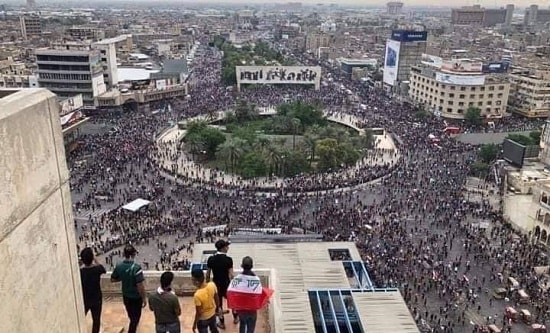
The state created by US and British imperialism following the 2003 invasion of Iraq is hanging by a thread. Throughout October and November a mass movement has arisen demanding far-reaching political and economic change. The brutal response has turned the movement from routine discontent to a real threat to the corrupt and sectarian state. More than 400 protestors have been killed and 15,000 injured. The movement has been anti-sectarian and has targeted the whole political class which has profited from oil and regional conflicts whilst the mass of Iraqi people has seen nothing but instability, poverty and decline. With US imperialism’s influence in the region waning, growing Iranian influence has been a major focus of demonstrators.
1 October was set as a day of protest on Facebook, with organisers demanding an end to high unemployment, a lack of basic services, and government corruption. On 25 September a protest in Baghdad for graduate jobs was met with police violence. On 29 September popular military leader Lieutenant General Abdul Wahab Al Saadi was sacked. These events made the 1 October protest a focus of national opposition to the government of Prime Minister Adil Abdul Mahdi, with the bulk of demonstrators being young, unemployed men. Security forces and pro-state militias responded with more violence, including military-strength tear gas and live ammunition, leaving many protestors killed and injured. In response protests spread across the predominantly Shia cities of the south, including Basra, Nasiriyah and Najaf – the supposed support base of the Shia-dominated government.
By 7 October, when the movement paused for the Shia festival of Arbaeen, 106 people had been killed and more than 6,000 injured. Protests resumed on 25 October, with 40 demonstrators killed in Baghdad, and the provincial government building in Nasiriyah set alight. Intensifying protests in the final week of November, with the Iranian Consulate in Najaf burned to the ground, finally forced Mahdi to announce his resignation on 29 November, following the interventions of powerful Shia clerics Muqtada Al Sadr and Grand Ayatollah Ali Al Sistani.
Iran’s major role in Iraqi affairs has been the target of the anger of many demonstrators. Following the initial protests Major General Qassim Suleimani, head of the elite Al Quds Brigade of the Iranian Revolutionary Guards Corps, arrived in Iraq. He has played a major role in directing the violent response, fueling anti-Iranian sentiment. Papers leaked to The Intercept have revealed the depth of Iran’s influence (17 November). Iran’s intelligence apparatus and the country’s influence over predominantly Shia militias in Iraq and elsewhere have seen Iran gain the upper hand over the US in the struggle for influence. As low-level conflict between US imperialism and Iran continues, the allegiance of powerful figures in Iraq has become even more important. Mahdi is widely seen as Iran’s creature. The dismissal of Lieutenant General Al Saadi prior to the protests was seen by many as a move to reduce US influence irrespective of military merit (Patrick Cockburn, The Independent, 30 September). Iran’s role in directing repression against the movement reflects its belief that protests across the region are being provoked by the US.
Simplistic narratives of Iran’s shadowy networks are a favourite of pro-imperialist media, and Iran’s direct regional control is frequently exaggerated. We cannot ignore the US and British imperialists’ constant meddling in Iraqi and Iranian affairs which has created the crisis conditions in Iraq and economic collapse in Iran. There can be no doubt that imperialist agencies are working hard to find ways to co-opt sections of the movement in Iraq and are very encouraged by anti-Iranian chants. However, working class people in Iraq are recognising that Iran’s theocratic state is seeking power in Iraq without concern for their standards of living. A movement for freedom and justice in Iraq can only be based on Iraqi self-determination. The danger of imperialist subversion is real, but a movement which articulates the anger of the poorest sections of Iraqi society will be well armed against this.
Toby Harbertson
Fight Racism! Fight Imperialism! 273 December 2019/January 2020




